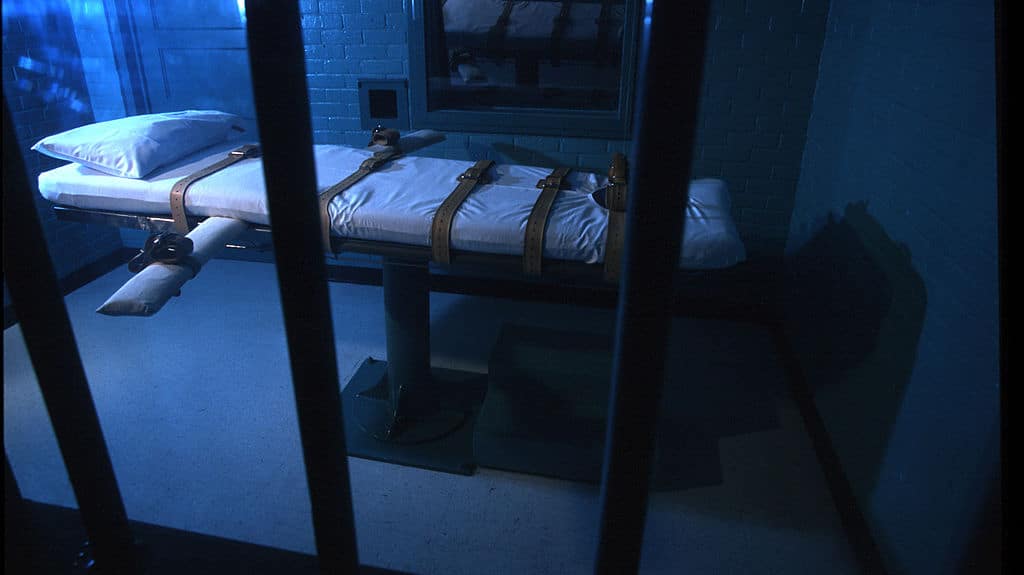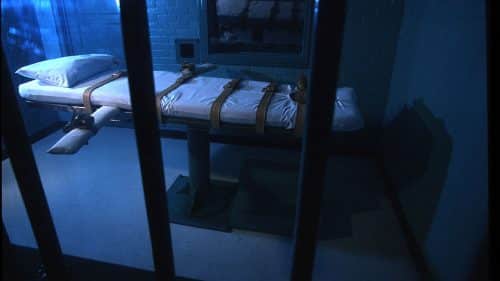
Iowa Republican lawmakers advanced a bill Wednesday reinstating the death penalty in Iowa for cases in which a person is convicted of killing a minor after kidnapping and sexually abusing them.
Senate File 14 would only apply the death penalty in cases where a person is convicted of multiple offenses of murder in the first degree, as well as kidnapping and sexual abuse in the first, second or third degree against the same minor. Under current law, the maximum penalty would be life in prison without possibility of parole.
Sen. Jason Schultz, R-Schleswig, said he would be open to expanding the death penalty as a sentencing option in the future.
“I believe this is justified religiously, morally, logically,” Schultz said. “There’s no reason not to support this in my mind. Saying that, I believe it could go further, but that’s not what we have before us.”
A Senate Judiciary subcommittee heard from multiple religious and legal advocates opposed to the death penalty for any reason.

Republicans in the Iowa Senate are trying to reinstate the death penalty in Iowa. (Photo by Joe Raedle/Newsmakers)
Religious leaders and lobbyists with the Iowa Catholic Conference, Episcopal Diocese of Iowa, Interfaith Alliance of Iowa and United Church of Christ of Iowa, argued the death penalty is immoral in all circumstances. Tom Chapman, executive director of the Iowa Catholic Conference, said it is possible to deter and prevent horrific crimes like the ones the bill targets without ending a person’s life.
“From our religious perspective, every person — every person — is made in the image and likeness of God,” Chapman said. “That’s their human dignity. And even those people who have committed great harm to the community and other people, they retain that human capacity to reform, to love and to be loved. And so we agree it’s the duty of the state to punish offenders and protect the common good, but we oppose reinstating the death penalty.”
There are reasons beyond religion that the death penalty should be opposed, Pete McRoberts with the American Civil Liberties Union of Iowa said. Lawyers and judges get things wrong, he said, and there are many examples of people being found innocent while waiting on death row. The Death Penalty Information Center found 190 people sentenced to death had been exonerated on all charges since 1973.
McRoberts argued Iowa’s judicial system has not proven it can be trusted to fairly sentence using capital punishment. He pointed to the disproportionate rates of incarceration for Black Iowans, who make up 4% of the state’s population but constitute 20% of people in jail and 24% of people in prison, according to a study by the Vera Institute, a research and policy nonprofit.
He also brought up the issues the Legislature is trying to address following an incident in 2021, when a district judge’s comments interfered with the judicial appointment process. Those problems show Iowa’s judiciary has structural flaws which could lead to unfair or incorrect death sentences if the bill becomes law, he said.
“Judges have the power to change lives,” McRoberts said. “And if this is enacted, judges and juries and the lawyers in the room will have the power to end lives. And I don’t think those are the people who should have all that power.”
Sen. Julian Garrett, R-Indianola, who chaired the committee, acknowledged it’s impossible for the courts to get every case right.
“Well, we’re human,” Garrett said. “We’re not claiming 100% perfection. But we’ve got a lot better mechanisms with using science now, with DNA and so on, where our chances are much better than they used to be of making sure we got the right person.”
Iowa has not had the death penalty since 1965, but legislation reestablishing it has come up many times over the past several decades. Former Republican Gov. Terry Branstad campaigned on bringing back the death penalty in his 1994 reelection race. The House approved it in 1995 but the bill did not clear the Senate. Death penalty proposals for specific crimes have not made it to floor debate in the years since.
Sen. Tony Bisignano, D-Des Moines, asked if there was enough support among the Republican caucus to successfully pass a death penalty bill this year, or if the governor has told Republicans she would sign it. Garrett said the Legislature does not need to get the governor’s approval to introduce or discuss legislation.
If the bill is approved by both chambers of the Legislature, the governor’s signature would be required to enact it.
All but one of the speakers at Wednesday’s meeting opposed the bill. But Garrett said that does not mean the death penalty is not popular with Iowans. He cited a 2021 national survey from the Rose Institute on State and Local Government which found 74% of respondents supported the death penalty when a person is charged with raping and murdering a child.
Garrett said the goal of the legislation was deterrence, specifically in preventing murders where a perpetrator kidnapped and raped a victim and planned to kill the minor to eliminate them as a witness.
“I think it will save innocent lives,” he said. “That’s the crux of the matter. And if we can save some innocent lives, then it’s appropriate for us to pass.”
Correction: This story has been updated to correct the identity of the chair of the subcommittee, who was Sen. Julian Garrett.
Iowa Capital Dispatch is part of States Newsroom, a network of news bureaus supported by grants and a coalition of donors as a 501c(3) public charity. Iowa Capital Dispatch maintains editorial independence. Contact Editor Kathie Obradovich for questions: info@iowacapitaldispatch.com. Follow Iowa Capital Dispatch on Facebook and Twitter.






